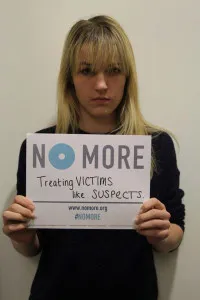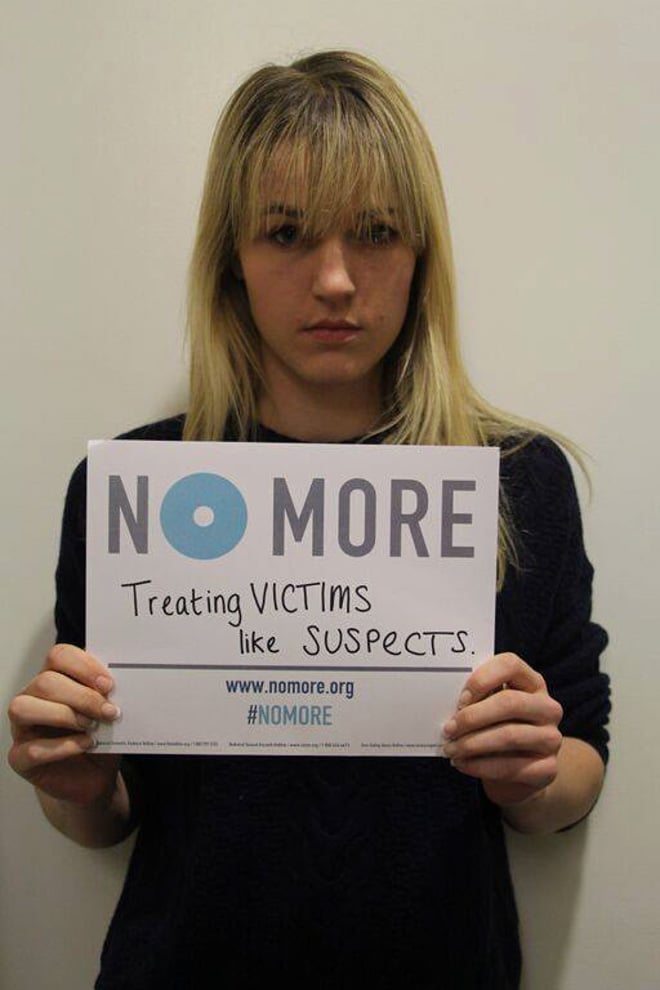
In 2011, students from a fraternity at the University of Vermont circulated an email asking members whom they wanted to rape. In 2010, Delta Kappa Epsilon members at Yale paraded around campus chanting what The Yale Daily News would later deem “an active call for sexual violence.”
Greek life has often found itself at the center of the sexual assault discussion nationwide. Although this issue is not isolated to Greek life, media and society often buy into a negative stigma of frequent sexual assault in the Greek community, often painting Greek life in a negative light.
This year, many Greek institutions at Stanford and their members are pushing back against this stigma. Madeleine Lippey ’18, philanthropy chair for Kappa Kappa Gamma, started a campaign called No More to help bring awareness to the issue and spur tangible action.
During the summer after her freshman year, Lippey interned for the Joyful Heart Foundation, a nonprofit that advocates for positive change in the sexual assault arena. Joyful Heart’s No More Campaign aired during last year’s Super Bowl. It showed NFL players holding up signs with the words “No More” written across the top. Each player’s sign advocated an end to an aspect of our culture that perpetuates sexual assault and rape culture.
“The most common ones are things like ‘No More she was asking for it’ or ‘No More boys will be boys,’” Lippey said.
Bringing the campaign to the Stanford campus, Kappa Kappa Gamma sisters stood outside in White Plaza a few weeks ago photographing passersbys who would write their “No More” statements on signs. The sorority, who has officially adopted combating sexual assault as its philanthropy project, wanted to involve everyone interested, but with an emphasis on the Greek community.
“We were really thinking about the communities that we wanted to reach the most deeply and that was fraternity life,” Lippey said.
Every fraternity on campus participated. Lippey cited SAE’s participation as the most impactful for her.
“Every single person in the documentary [“The Hunting Ground”] is familiar with SAE as Sexual Assault Expected,” Lippey said. “We walked in to SAE where they meet every week and they said to us: ‘Can we write No More SAE = Sexual Assault Expected?’ And to me that was the entire point of doing this. The entire point was to have men just stand up and say we’re not OK with this either.”
The first pictures that went up online of Kappa Sigma members received over 10,000 views in around three hours.
“I feel like people really listen to those men. Those are the men that are serving alcohol. Those are the men that are throwing parties,” Lippey said. “And then for young women to see those photos and understand that men don’t want this either is really important to them feeling safe at Stanford.”
This “safety” Lippey alludes to is what passionate students across campus are working toward.
One of those students is Scott Arkin ’18. A member of Sigma Nu, Arkin was inspired by his aunt’s involvement in “The Hunting Ground” documentary as well as an incident at Sigma Nu at Old Dominion to bring more education about the issue to campus.
Arkin organized a screening of the documentary with a post-screening discussion led by Yisrael Donnovan, manager of emotional and sexual health programs at Vaden. His hope was to spark dialogue, but the result was even more impactful.
“A bunch of guys in my house came up to me and personally thanked me for putting it on,” Arkin said. “That just really showed to me how many members are actually very concerned about this.”
Although fraternities like Sigma Nu are making a tangible effort to curb sexual assault, it is still unclear whether these events will actually change the culture and bring about the “safety” for which so many yearn.
“I think the most effective way to change it is from within,” Arkin said. “Fraternities tend to be very insular in how they operate and so it’s really hard if its only external pressure to cause a change.”
Arkin emphasizes how difficult it is to change fraternity mindsets solely through University regulations.
“It’s important that the administration also has harsh guidelines and just punishments for any perpetrators as well as any houses where, if it’s a house that isn’t safe, the University should take action,” Arkin said. “But unfortunately it doesn’t matter how legitimate the cause was. If the University takes a house from a big group of guys or tries to put them on probation, the guys in the house are going to think ‘this is bullshit’ even if it’s not.”
Lippey and Arkin both believe that the most effective change comes from peers working together to change the culture. Peers are more likely to make an influential impact on each other.
Matthew Baiza ’18, co-founder of One in Five, a student group dedicated to educating about sexual assault, agrees.
“We really need to try to work to change the culture,” Baiza said. “Not just at our campus but around the nation.”
In researching the climate on campus, the student group realized that what was missing at Stanford was students educating other students.
“We tried to look at the institutional efforts of the University,” Baiza said.
“With that we felt that the university could do more to work to educate people, to make them aware,” he added. “We saw that one thing that was missing was student involvement on the issue.”
From a fraternity to a sorority and even a Greek-unaffiliated group, all unanimously concur: Students need to be at the focal point of the issue if Stanford is going to be successful in changing a nation-wide culture.
Although the Greek system is often stigmatized, Baiza acknowledges that the problem extends further than the Row.
“It’s not just a Greek life issue,” he said. “It’s an issue that extends past Greek life and really is an issue for the general population at Stanford.”
The Greek community is pushing back, and so is the Stanford community at large. Students want Stanford’s prestige to extend beyond academics.
“We want to see the University take steps to be the leader that it says that it is and that we know it is,” Baiza said.
With initiatives like Lippey’s, Arkin’s and Baiza’s, Stanford seems to be moving forward, with the Greek community leading the way.
“There’s a real hotbed of activism and a hotbed of passion for this issue at Stanford and at universities across the country. And I’m an optimist,” Lippey said. “I find it hard to believe that nothing good can come from… good people trying to do what they can to change the culture. I think that if there’s enough people behind it, that’s when the culture will change.”
Contact Yael Lederman at yael3 ‘at’ stanford.edu.
